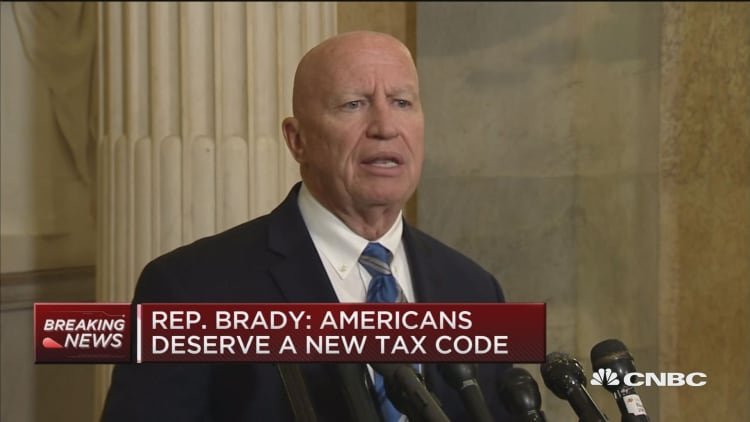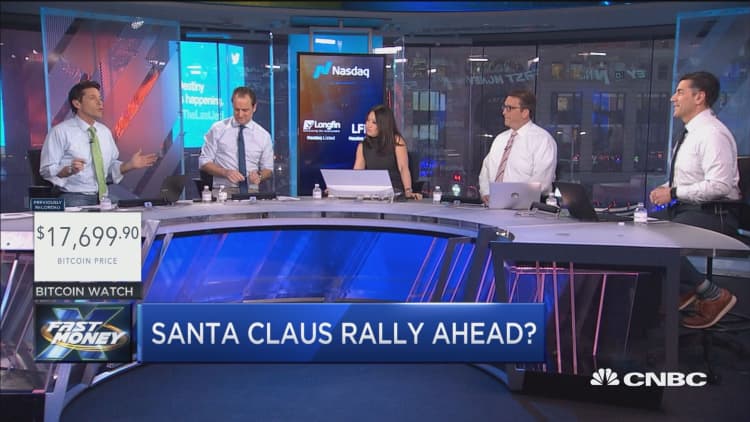
In 15 years representing Oklahoma in the House, Tom Cole has earned praise from Democrats and fellow Republicans alike. He's a PhD historian with a talent for campaign strategy, a genial conservative with pragmatic instincts.
That makes him as good as anyone to ask: Why are Republicans rushing to pass an unpopular tax bill that economists predict will increase deficits without fueling much economic growth?
Cole's lengthy answer boiled down to one simple concept: The onetime college football lineman has decided to trust his coach's play call and block for the Republican team.
As a member of the Appropriations Committee, he specializes in allocating funds for government programs, not raising those funds through tax policy. "I can't tell you I'm a deep economic thinker," he says.
So he relies for advice on colleagues from the tax-writing Ways and Means Committee. Though mainstream forecasters like the Joint Committee on Taxation and University of Pennsylvania have issued unflattering analyses of GOP proposals, Cole says his tax-committee colleagues tell him other models offer sunnier results in line with his core belief that lower taxes boost the economy.
He doesn't know what those models are, but doesn't worry about that. He distrusts economic forecasts across the board because, he says, they're so often wrong.
"I don't find any of that persuasive," he explains. "There are about as many economists as there are opinions."
That helps him discount as merely political complaints from opponents that the bill will drive up the national debt. "A talking-point issue back and forth," he says.
He complains Democrats ignored Republican warnings about the debt under President Barack Obama. And as an advocate of smaller government, he insists deficits produced by spending programs hurt more than deficits produced by tax cuts.
"If someone wants to get serious about debt, come talk to me about entitlements," he explains, pointing toward the Social Security and Medicare behemoths. "Tax cuts produce growth, entitlement spending doesn't."
Besides, Cole adds, "It's really a modest gamble either way." With the federal government already projected to reach $30 trillion in debt by 2027, he reasons that another $1 trillion or so from the tax bill won't matter much.
That doesn't mean Cole likes how the bill gives bigger benefits to the wealthy than families with modest incomes. One of two Native Americans in Congress, he represents a state ranked among the poorest one-third in the nation by median income. He wrote his doctoral thesis on a working-class community in 19th century London.
He says the bill could help blue-collar families more by cutting payroll taxes for low earners and raising them for higher earners in a "stairstep" pattern. He decries the survival of the "carried interest" tax break benefiting affluent hedge-fund managers, among others, a tax break he has opposed for years.
"It just seems wrong," Cole says. "We'd be better off if there were more populist victories in there."
Yet those objections don't shake Cole's determination to vote "yes." He cites cues he has received from two mutually reinforcing sources.
One is record-setting stock prices. "I'm in the stock market," he explains, "and I've sitting here watching the collective judgment of the business community."
"I didn't see anything like that in the Obama years," Cole adds. In fact, the Dow Jones Industrial Average more than doubled under President Obama, and had risen more in percentage terms by this point in Obama's first year than in Trump's.
The other is colleagues on the tax-writing committee. Republicans there "tend to have more the mindset of Wall Street and the financial community," he observes, and "they've done their homework."
"In the end I'm going to trust the people who are philosophically aligned with me," he says. In Paul Ryan, "I've got a speaker who's forgotten more about economics than I know."
"We'll see if we're right or not," he concludes. "There'll be political consequences to that — either rewards or punishments."
He knows voters could administer the latter. In 2008, when he chaired the GOP effort to win back the House, Republicans lost two dozen more seats as Obama won the presidency.
WATCH: Dow could hit 25K before Christmas because of taxes



